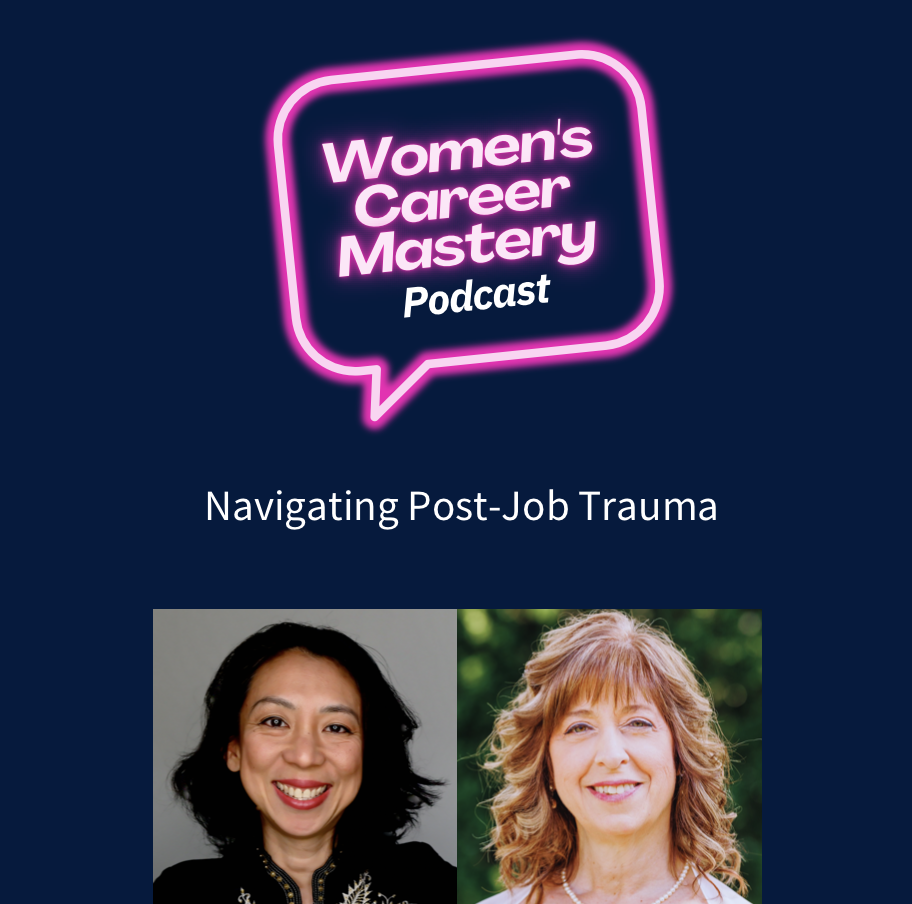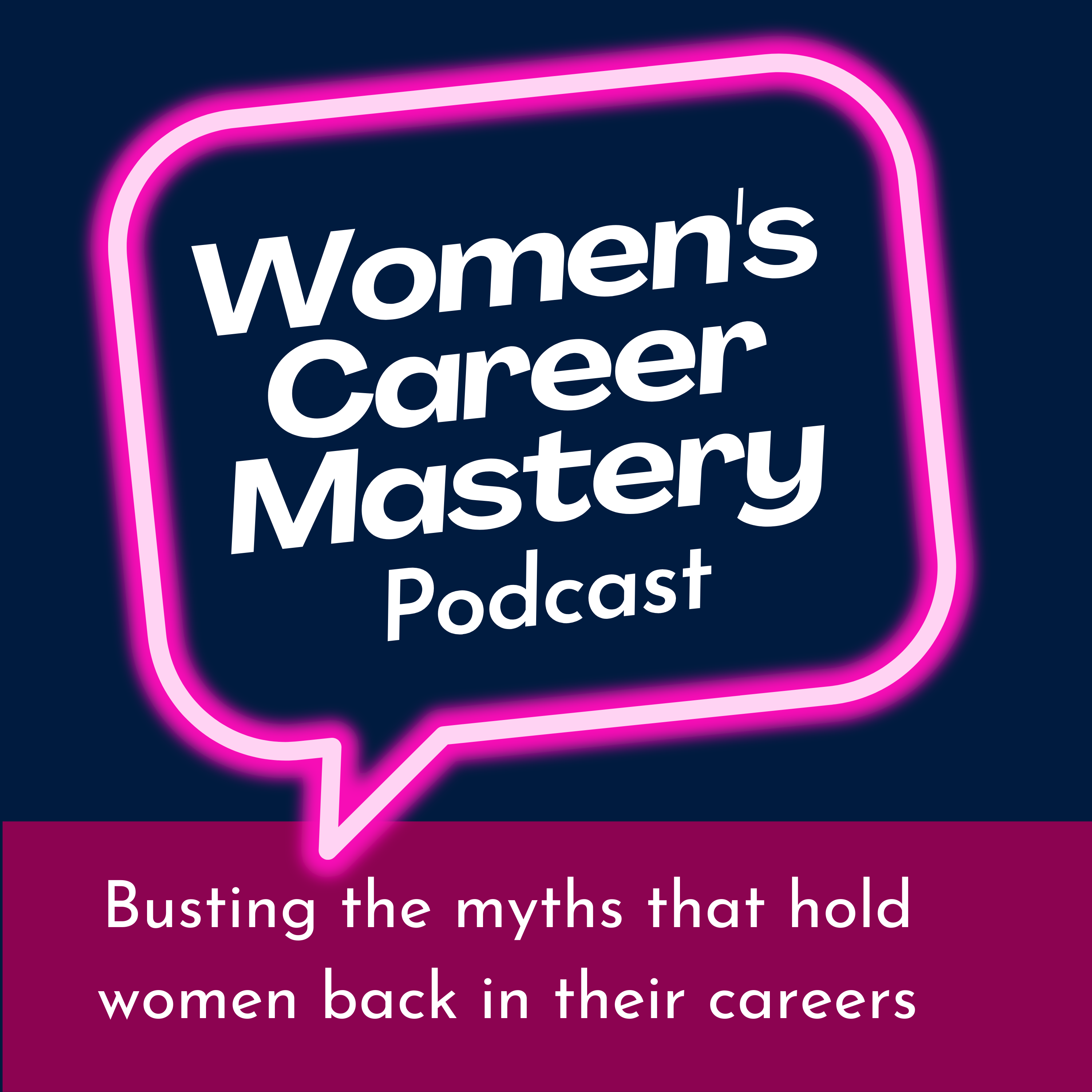

#9 Navigating Post-Job Trauma
Women's Career Mastery Podcast
| Various Guests | Rating 5 (2) (0) |
| https://www.womenscareermastery.com | Launched: Sep 28, 2023 |
| lauracasale021@gmail.com | Season: 2023 Episode: 9 |
In this candid and insightful podcast episode, Christine Samuel and Laura Casale delve deep into the often-overlooked topic of Post-Traumatic Job Trauma (PTJT). Drawing from their personal experiences, they shed light on the profound impact this phenomenon can have on both physical and mental health. Through their conversation, Christine and Laura share their own reactions and coping mechanisms, offering a window into the complex world of job-related trauma. They explore the far-reaching implications on work performance and the corporate environment, examining not only the internal factors but also external conditions like extreme heat and inadequate work facilities. Laura underscores the importance of self-awareness and the utilization of company-provided mental health resources, while also advocating for individual self-care and the implementation of corporate mindfulness programs. In a heartfelt discussion on layoffs, they address the diverse experiences and perspectives of those affected, emphasizing the importance of support, dialogue, and prioritizing well-being. Christine and Laura ultimately impart a message of resilience, growth, and gratitude, encouraging listeners to share this episode with anyone navigating the challenging landscape of job-related trauma.
Follow us for updates on LinkedIn: https://shorturl.at/ioLXY
For inquiries, email us at: womenscareermastery@gmail.com
Women’s Career Mastery Program (for corporations): https://innerworkmatters.com/womens-career-mastery-program
Women’s Career Mastery Program Registration (for individuals): https://www.womenscareermastery.com/
SUBSCRIBE
Episode Chapters

In this candid and insightful podcast episode, Christine Samuel and Laura Casale delve deep into the often-overlooked topic of Post-Traumatic Job Trauma (PTJT). Drawing from their personal experiences, they shed light on the profound impact this phenomenon can have on both physical and mental health. Through their conversation, Christine and Laura share their own reactions and coping mechanisms, offering a window into the complex world of job-related trauma. They explore the far-reaching implications on work performance and the corporate environment, examining not only the internal factors but also external conditions like extreme heat and inadequate work facilities. Laura underscores the importance of self-awareness and the utilization of company-provided mental health resources, while also advocating for individual self-care and the implementation of corporate mindfulness programs. In a heartfelt discussion on layoffs, they address the diverse experiences and perspectives of those affected, emphasizing the importance of support, dialogue, and prioritizing well-being. Christine and Laura ultimately impart a message of resilience, growth, and gratitude, encouraging listeners to share this episode with anyone navigating the challenging landscape of job-related trauma.
Follow us for updates on LinkedIn: https://shorturl.at/ioLXY
For inquiries, email us at: womenscareermastery@gmail.com
Women’s Career Mastery Program (for corporations): https://innerworkmatters.com/womens-career-mastery-program
Women’s Career Mastery Program Registration (for individuals): https://www.womenscareermastery.com/
Hello everyone and welcome back to our podcast. This is a very short podcast and it's just with Christine and Laura and we're going to discuss about post traumatic job trauma, PTJT, and the reason why we want to talk about it because we are the survivors. We experience it before we learn from it. And we also hear a lot of clients experience it these days through layoffs and also toxic cultures. Without any further ado, I'm going to ask Laura, what is post traumatic job trauma?
Hey, Christine. It's so great to be back here with you again, and this is such an important topic, and it's a real thing – post-traumatic job trauma. I didn't really know it until we came out the other side of it. It's when you know you have some sort of emotional or psychological reactions or receive an impact from a traumatic experience that you have on the job. It could be from various workplace stresses – always stressed, and sometimes in corporate settings, especially technical or medical fields. There could be harassment. Maybe you were harassed; maybe there was discrimination, bullying, gaslighting, or maybe you had an accident on the job. Just like an accident anywhere in life that you might have, and just maybe extreme stress, trying to do something, and you can't do it, and you're getting constant resistance. There are so many ways that it can show up to have some sort of stress, and it's different for everybody. What might be stressing me out might not stress you out. What might be traumatic to Christine might not be traumatic to me. So it's very individual, but it's definitely something you experience when at work or when on the job or in the context of your job. And then you have an aftereffect to it, and from that, you manifest this like post-traumatic trauma, if you will. It can show up in many ways; it can be triggered in many ways. So let's talk about it, Christine. Let's talk about some of the things so we can help share some awareness of this. So people don't have to get to the point where they're dealing with this PTJD situation.
Yeah, and I think, you know, coming from my own personal experience, when I'm in it, I didn't really realize that was it. The things that I experienced were very overwhelming stress, here it's affecting the way I work, it's affecting my performance. But at the moment that it happened, most people are not aware until they get out of it. I want to ask about your experience, Laura. What kind of symptoms did you have in your experience on this? I'm happy to share because I believe, you know, in sharing our stories, it can help others. I didn't know it when I was going through it either. So for me, some of the symptoms that were coming up based on the trauma that I was experiencing in work – again, it varies from individual to individual – and I don't want to talk about the actual trauma, but some of the symptoms that were showing up, which I now recognize to be part of the impact from the trauma, was that I became a perfectionist at one point in my career. About that time, perfectionism went to a super high level, right? I was trying to prove in the situation I was in that I could do what I was needed to do in my job, and I could do it better than I could ever do it before. I was being tested constantly, so I couldn't stop with the perfectionism. So that behavior was driving me a bit insane. It was causing me a lot of emotional stress, which then manifested into physical stress, right? I started to have some physical symptoms, and I didn't recognize it, but my family did. So it was at that point that I decided I needed to address this, and I needed to address it in a different way. So that was it for me. It started with my behavior, trying to prove myself that I could do things perfectly, and then I became really stressed and anxious, and that showed up in my physical well-being.
Isn't it interesting?
I felt there's two different aspects of it. One is from within ourselves, for example, in your case, being a perfectionist. But it could also be from the environment. You know, like stress and trauma are contagious. They are contagious because, let's say, if your managers or a few people in the group are experiencing stress or feeling unsafe in their role, it will affect the whole team, because that's the way we interact with others. For me, I also experienced a situation where I knew my manager was stressed and controlling, and that was affecting the culture in the team. So it's a very complex matter, and I wonder, what about this?
Can I jump in? Yes, sure.
Like, what do you want? Because I need, I need like a bridge to go to you.
I was going to give another example based on the current environment today, like with the heat sustainability, such as a global warming example of employees having to work in the heat with no air conditioning, and how that could be traumatic if it's not addressed. So it doesn't have to be, you're saying internal or external. Here's a good external example because I do have a client that's dealing with this right now.
Okay, and then the one which is about the environment, not about the people, but about the work conditions. Laura, do you have some examples of that?
I do, actually. You know, if you're anywhere in the South in the United States, or even in many countries outside the United States, there's extreme heat from global warming. Right now, we're all facing this extreme heat, and I've heard from one client that the air conditioning broke down in the building, and they're not able to get cool. There's no cool air, and the employer is not letting people work from home when we've proven we can work from home during the pandemic. So, people are really hot in the office, and it's making them not feel like the employer is treating them well.
While it might not be traumatic at the moment, the message that's coming across from the employer not letting people work where it's cool can be traumatic. So, you know, how do you stand up for yourself and take care of yourself in that kind of situation? But that one little situation and this time right now could have a huge impact on somebody's life and career. So, I think it's not always internal; it's not always manager-related. Sometimes it's environment-related. Yeah, and it seems like there's a couple of things where it's underaccumulated, like small things, small policies, small instructions, or small behavior that is accumulated, and it creates something big. It's always an environment issue.
If it's just about ourselves, or about our manager, or our culture, and it's very important, that means it's all related to mental health. Like this job trauma, it's related to our mental health. And when it's related to our mental health, what happens is it's going to affect our performance. Performance is not just about ourselves, but about the collective objective and the goals of what we all want to achieve. Would you speak more about that, Laura?
Sure. So, I'm not a mental health expert by any means, but we understand what it is, and we know it's important, especially in the workplace. You know, how do you get ahead of this trauma? Self-awareness is really important, but that's on the individual, but also on the management and the company. And then providing resources and maybe support systems. A lot of companies have employee assistance programs where you can go for support if you're dealing with a stressful situation. If you're not sure where to find them, you can contact the HR person. There are laws in place, like the example I gave before with the heat. I mean, I'm sure that there is an OSHA, which is an organization that focuses on the health conditions in the workplace for employees.
And then there's self-care things that you can do. A company that Christine and I worked for had a mindfulness movement. There were actually moments in the day where you could take time for mindfulness, however that showed up for you. You can take self-care like I like to exercise in the morning because that makes sure that my motivation level and my energy level are geared up and ready for any challenge that I come across during the day. It can show up in different ways. Do you want to expand a little bit on maybe your experience with mindfulness Christine?
I know you did a lot with that. Yeah, I found mindfulness really helpful in the moment when you experience something challenging. In a way, there are a couple of things; sometimes when it's happening, it accumulates a lot of struggle inside, like emotionally how we cope through our experience. And like you said, Laura, about self-awareness, that's where the mindfulness arises; that's where the mindfulness is needed. Because we can ground ourselves, even though things are not working well. It's also the understanding or knowing that we are resilient, we are resourceful, and we're able to go into a different state or a different side of ourselves that can help us regulate whatever we experience.
I also want to tackle one thing that is very relevant today. There's a lot of layoffs, and I felt there's a different way of coping, whether you're still in the job or you are out of the job because of trauma. Do you have any perspective on that?
Yeah, I was actually going to say that's another really good example. Whether you've been in a layoff yourself, like you've been a part of a situation where you've been laid off from a job, that's traumatic. That could be very traumatic, typically unexpected, so it can be traumatic. Or sometimes you are the person that is not laid off, but there is a layoff in the company, and you feel, you know, am I next or why did I survive? It's just traumatic to lose your team that you were working with or your best friend that you were working with. So there's trauma on both sides. And then I think there's trauma for the people who have to do the layoffs. It's a business decision, it's not a personal decision, but to actually be in a position where you have to lay people off is painful. It's not something that a company usually selects as the first option if they have to make some sort of cost-saving or business change decisions. Layoffs are complex as well, and the trauma from that, for sure, that's another important one. It's good to be aware of it, and I think it's really good to talk about it. I often find people that I'm coaching have experienced it in one way or another that I was describing, and they don't know who to talk to. But they know they need to talk to somebody other than their spouse or their friend, but somebody who really understands, who's been through a layoff and can help them put it in perspective and feel comfortable and feel certain again, like, "Okay, I've got to get back to my job. So how do you gain ground back and feel some certainty in what you're doing and not just that you survived in whatever way you were impacted by it?"
Yeah, I think you brought up a very interesting point that there are so many different people involved, and they all feel the impact. I used to work in tech, so I experienced this not just one time but many times. And I always can see it's a good thing in hindsight because that gives you a different opportunity. So at the end of the day, I always feel grateful that it's happened because it gave me a different opportunity that I would not have tried otherwise. I guess that's from that perspective. I totally agree, Christine, and there's so many things we can talk about here. But we wanted to just leave you with this short episode to let you know that yes, this is a scary place when you're dealing with post-traumatic job trauma. It's an uncomfortable conversation to have. Sometimes it's a bit uncomfortable for us talking about it here on the podcast, bringing up memories. And we're wanting to make sure we provide some information, but we're not experts on it, but just to bring this topic to the surface. And we really encourage everybody to talk through it with someone, find support wherever you can in the company, outside the company, and really prioritize your health and well-being, especially when going through this type of situation.
Yeah, I also want to put something out there. When you see or you want your experience, the post-traumatic job trauma, there are two things you can experience: the downturn, but also there is post-growth after it. I would invite everyone who experienced it to also see this as a gift. I know it's hard sometimes to see it as a gift, but as an invitation and see other opportunities that we might not be able to see when we are so busy in our workforce. There is always something to learn from, and I know for myself looking back, I always feel grateful that those happened because it makes me a better person.
Same here. I think that as traumatic as it was going through it, I'm grateful for it on the other side because of all the growth, more fulfillment in my life at this point in my career. So definitely very grateful for it. Alright, everyone, that's about it, and we invite you to also share this episode if you know anyone who has experienced this PTJT or is about to go through it right now. And until next time, have a great day. Thank you for joining us on this episode of Women's Career Mastery. To ensure you don't miss any future episodes, please subscribe to our podcast on your preferred podcast platform. If you found this episode enjoyable, please leave us a review or give us a thumbs up. Your support helps us reach a wider audience who could benefit from our content.
Also, if you want to learn more about us and our guests, please make sure to check out the show notes for this episode. Thank you again for listening, and we look forward to connecting with you on the next episode of Women's Career Mastery.



